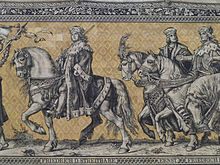Ernest, Elector of Saxony
show This article may be expanded with text translated from the corresponding article in German. (September 2012) Click [show] for important translation instructions. |
This article needs additional citations for verification. (April 2017) |
| Ernest | |
|---|---|
 | |
| Elector of Saxony | |
| Reign | 7 September 1464 – 26 August 1486 |
| Predecessor | Frederick II |
| Successor | Frederick III |
| Landgrave of Thuringia | |
| Reign | 17 September 1482 – 26 August 1486 |
| Predecessor | William II |
| Successor | Frederick VI |
| Born | 24 March 1441 Meissen, Electorate of Saxony, Holy Roman Empire |
| Died | 26 August 1486 (aged 45) Colditz, Electorate of Saxony, Holy Roman Empire |
| Burial | |
| Spouse | Elisabeth of Bavaria-Munich |
| Issue among others... | Christina, Queen of Denmark Frederick III, Elector of Saxony Johann, Elector of Saxony Margarete, Duchess of Brunswick-Lüneburg |
| House | House of Wettin |
| Father | Frederick II, Elector of Saxony |
| Mother | Margaret of Austria-Styria |
| Religion | Roman Catholicism |
Ernest (24 March 1441 – 26 August 1486) was Elector of Saxony from 1464 to 1486.
Ernst was the founder and progenitor of the Ernestine line of Saxon princes,[1] and a direct patrilineal ancestor of Queen Elizabeth II (United Kingdom), Michael, Prince of Saxe-Weimar-Eisenach (Saxe-Weimar-Eisenach), Konrad, Prince of Saxe-Meiningen (Saxe-Meiningen) and Andreas, Prince of Saxe-Coburg and Gotha (Saxe-Coburg and Gotha).
Biography[]

Ernst was born in Meissen, the second son (but fourth in order of birth) of the eight children of Frederick II, Elector of Saxony and Margaret of Austria, sister of Frederick III, Holy Roman Emperor. The death of his older brother Frederick (1451) made him the new heir apparent to the position of Elector of Saxony.
In 1455 Ernst was briefly kidnapped, along with his brother Albert, by the knight Kunz von Kaufungen an episode famous in German history as the Prinzenraub[2] (i.e. The Stealing of the Princes).
In 1464, he succeeded his father as Elector of Saxony, and annexed Thuringia in 1482, and three years later (Treaty of Leipzig, 1485) shared his territory with his brother Albert, until he arranged the division of the common possession.
According to the Treaty of Leipzig he received an area around Wittenberg, the southern Thuringian part, the Vogtland and parts of the Pleissnerland. As a residence he selected Wittenberg. He provided for the welfare of the country and introduced the constitution.
One year after the division, Ernest died in Colditz, at the age of 46 years, the consequence of a fall from a horse.
Children[]

In Leipzig on 19 November 1460 Ernst married Elisabeth of Bavaria. They had seven children:
- Christina (25 December 1461, Torgau – 8 December 1521, Odense), married on 6 September 1478 to King John I of Denmark
- Frederick III, Elector of Saxony (17 January 1463, Torgau – 5 May 1525, Lockau)
- Ernest (26 June 1464, Meissen – 3 August 1513, Halle), Archbishop of Magdeburg (1476–1480), Bishop of Halberstadt (1480–1513)
- Adalbert (8 May 1467, Meissen – 1 May 1484, Aschaffenburg), Administrator of Mainz
- Johann, Elector of Saxony (30 June 1468, Meissen – 16 August 1532, Schweinitz)
- Margarete (4 August 1469, Meissen – 7 December 1528, Weimar), married on 27 February 1487 to Henry I of Lüneburg
- Wolfgang (c. 1473, Meissen – c. 1478, Torgau).
Ancestry[]
| showAncestors of Ernest, Elector of Saxony |
|---|
References[]
- ^ Trim 2003, p. 214.
- ^ Chisholm, Hugh, ed. (1911). . Encyclopædia Britannica. 11 (11th ed.). Cambridge University Press. p. 60.
Sources[]
- Trim, David J. B. (2003). The Chivalric Ethos and the Development of Military Professionalism. BRILL. ISBN 978-9004120952.
| Wikimedia Commons has media related to Ernest, Elector of Saxony. |
- 1441 births
- 1486 deaths
- People from Meissen
- Electors of Saxony
- House of Wettin
- Saxon princes
